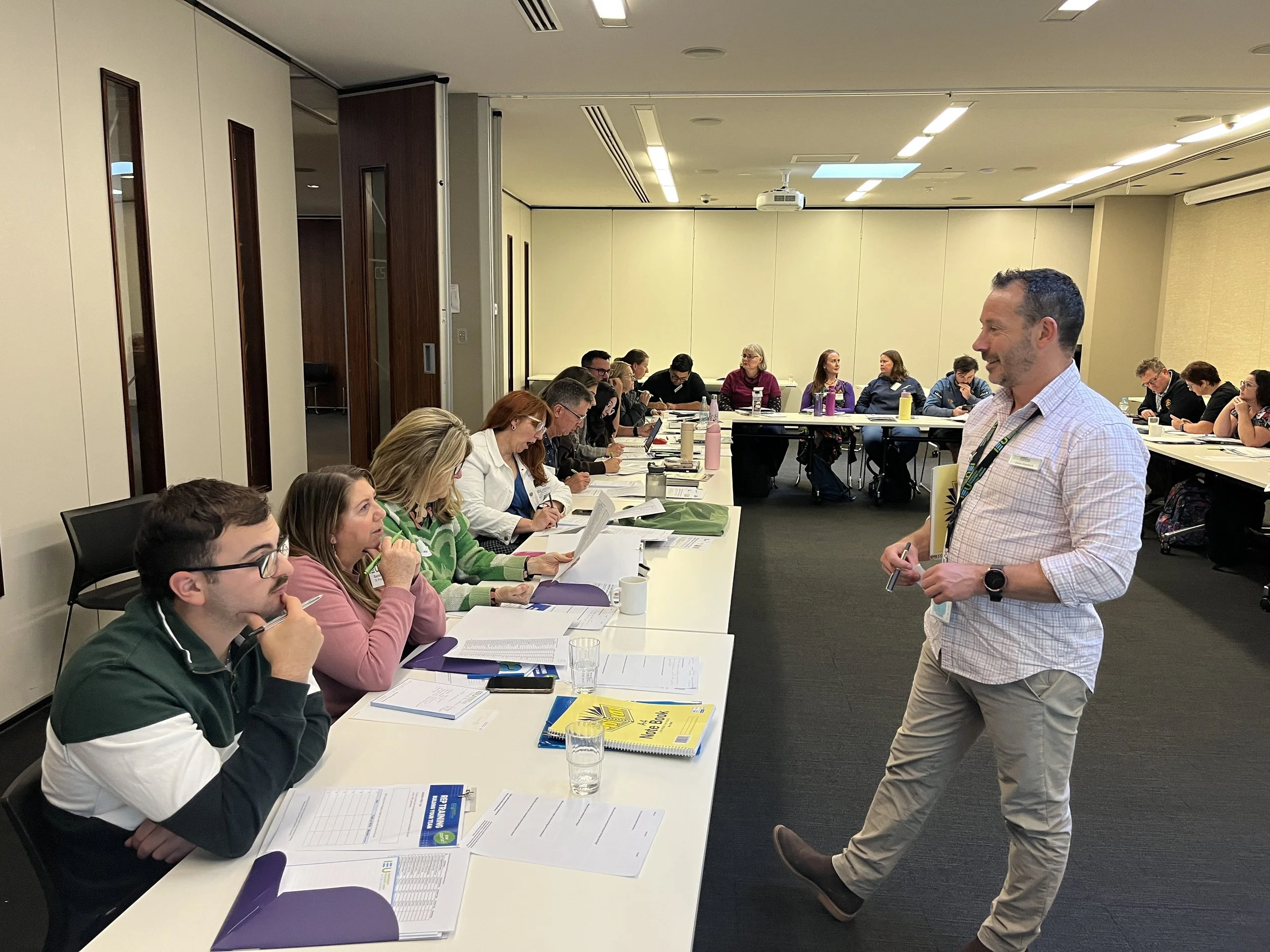IEU Reps revel in team-based training
While they have stood up to take the lead role in their sub-branches, IEU Reps are keenly aware that teamwork is required to help individual members, create strong sub-branches and make the IEU effective.
Over 30 Reps participated in Building Your Team sessions 1 May, at union headquarters in South Melbourne, and the need to spread the load was the dominant theme.
Sandi Dinsdale, left, participating at Rep training.
Sandi Dinsdale, Rep at St Peters College, Cranbourne, was pleasantly surprised that she wasn’t just handed a checklist of actions to follow.
“Instead, it was much more about figuring out who we are and how we fit into the role best. I really appreciated that. It shows some good critical thinking and an acknowledgment that not all of us are bulldogs — and we don’t have to be.”
Sandi says she can find her inner “bulldog” when necessary but it’s not where she’s most comfortable.
“Fortunately, we’ve got some great team members, and this session provides inspiration for us to form our own subcommittee.
“We’ve identified about 12 people who want to be more active but haven’t found their space yet. Many of them are in leadership roles, which often becomes a barrier — they’re already stretched. But this sub-committee approach gives people a way to contribute in small ways, which helps us share the load.
“Too often everything falls on the Rep, and there’s not enough of the collegiate, collective union spirit — which is what unionism should be about. Today gave us great ideas on how to do that and what strings to pull.”
Robyn Schiller, Rep at St Leonards, Brighton, also said she is “not very combative”, but she’s “very determined to do the right thing by the members”.
“Over the course of my career, I’ve seen our working conditions eroded, and I feel like we’re losing great teachers — often because, for some reason, management in many schools isn’t willing to make small changes. But it’s those small changes that can have a big impact on someone’s wellbeing, their capacity to do their job well, and to feel valued and supported at work.
“So I see my role not as someone who shouts from the rooftops, but more as someone who nudges management along — encouraging them to come on the journey to make our workplace the best it can be.”
Robyn said the collegiate approach of the training really resonated with her.
“The organiser talked about how you don’t have to be the combative cliché of a union Rep — that it’s not just about being loud or extroverted or naturally good at organising people. That’s a view I used to have before I got involved.”
Robyn said the training helped her realise “there are different styles for different things”.
“I already had a sense that I’d need to work differently moving forward, and this confirmed it. I’ve organised a team of six people to be on my bargaining team — because we’re about to go into EBA negotiations, which honestly terrifies me.
“That’s what I’m trying to keep in mind: I don’t have to do it all myself. Today’s training helped reinforce that different people bring different strengths. If I’ve chosen well, I should have a strong team behind me for negotiations. And hopefully that also means the spotlight isn’t always on me — so when things don’t get implemented, the members don’t just blame me, and management doesn’t just see me as the agitator.”
Training sessions perform a crucial role not just by offering practical solutions and honing skills, but through the different experiences Reps share with each other.
Chris Ruys, a new Rep at Killester College, found the feedback from colleagues important for an unexpected reason—his school is too accommodating!
“Our school has a very positive relationship with the union. So seeing what it’s like in other places—almost like the "real world"—is important. It helps when I go back, because in my school, the challenge of getting people to join the union is that things are already pretty good.
“People think, ‘Why do I need to join? The school's already looking after me.’ And our school does genuinely care about staff. So we don’t face the same challenges that other schools do.”
Chris says highly respected principal Sally Buick encourages union membership and contact the IEU herself for support. The union has found Sally a model leader, enabling a constructive relationship with Killester, which Chris says is a major asset to the school.
An example?
“Sally had union Reps come and talk to our consultative committee about the staff wellbeing role, and now we’ve had someone come run a session, and they’ll be consulting with us for the next year or so.”
Chris says recruitment is “a little easier now” because Sally is moving on from her role, and staff don’t know what’s coming next.
But “having it good” emphasises extra dimensions of union membership.
“It’s about having a collective voice. So many of the things we have now weren’t just handed to us—they’re the result of union work.
“So I ask (a potential member), ‘Do you really just want to take that for granted, or would you rather contribute to it?’
“Even with the best intentions, schools can’t prevent everything. There are risks, especially as a male teacher—you can be accused of all sorts of things.”
Chris held a meeting the day before the training for all the Killester male staff at the girl’s school, “partly to support male staff and partly as a reminder about how to keep ourselves safe”.
“It's a good reminder that this isn't a risk-free profession, and having the union behind you can really help.”



























